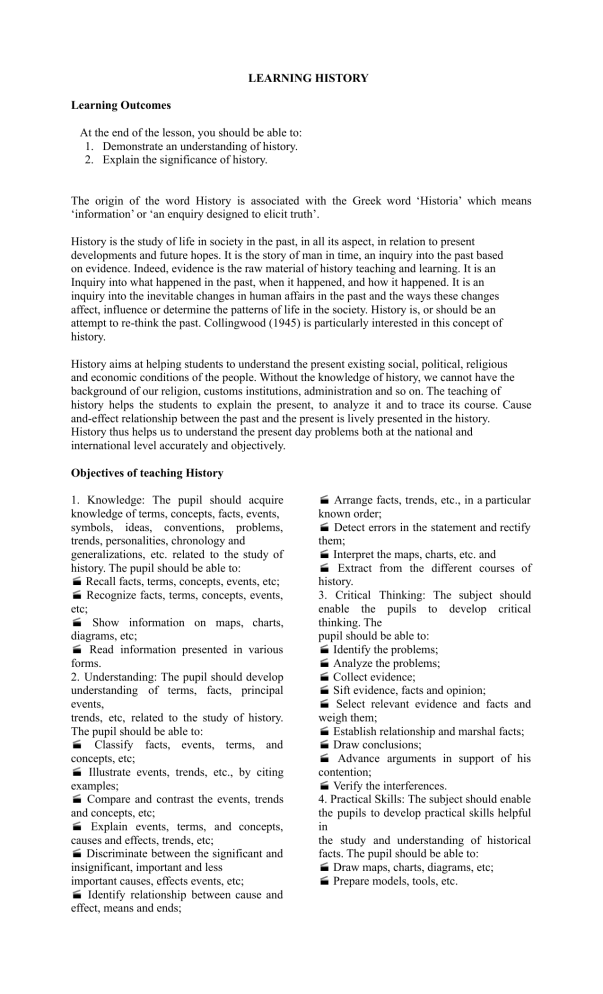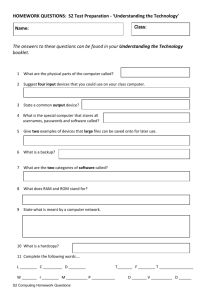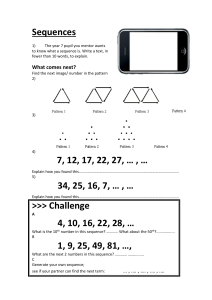
LEARNING HISTORY Learning Outcomes At the end of the lesson, you should be able to: 1. Demonstrate an understanding of history. 2. Explain the significance of history. The origin of the word History is associated with the Greek word ‘Historia’ which means ‘information’ or ‘an enquiry designed to elicit truth’. History is the study of life in society in the past, in all its aspect, in relation to present developments and future hopes. It is the story of man in time, an inquiry into the past based on evidence. Indeed, evidence is the raw material of history teaching and learning. It is an Inquiry into what happened in the past, when it happened, and how it happened. It is an inquiry into the inevitable changes in human affairs in the past and the ways these changes affect, influence or determine the patterns of life in the society. History is, or should be an attempt to re-think the past. Collingwood (1945) is particularly interested in this concept of history. History aims at helping students to understand the present existing social, political, religious and economic conditions of the people. Without the knowledge of history, we cannot have the background of our religion, customs institutions, administration and so on. The teaching of history helps the students to explain the present, to analyze it and to trace its course. Cause and-effect relationship between the past and the present is lively presented in the history. History thus helps us to understand the present day problems both at the national and international level accurately and objectively. Objectives of teaching History 1. Knowledge: The pupil should acquire knowledge of terms, concepts, facts, events, symbols, ideas, conventions, problems, trends, personalities, chronology and generalizations, etc. related to the study of history. The pupil should be able to: Recall facts, terms, concepts, events, etc; Recognize facts, terms, concepts, events, etc; Show information on maps, charts, diagrams, etc; Read information presented in various forms. 2. Understanding: The pupil should develop understanding of terms, facts, principal events, trends, etc, related to the study of history. The pupil should be able to: Classify facts, events, terms, and concepts, etc; Illustrate events, trends, etc., by citing examples; Compare and contrast the events, trends and concepts, etc; Explain events, terms, and concepts, causes and effects, trends, etc; Discriminate between the significant and insignificant, important and less important causes, effects events, etc; Identify relationship between cause and effect, means and ends; Arrange facts, trends, etc., in a particular known order; Detect errors in the statement and rectify them; Interpret the maps, charts, etc. and Extract from the different courses of history. 3. Critical Thinking: The subject should enable the pupils to develop critical thinking. The pupil should be able to: Identify the problems; Analyze the problems; Collect evidence; Sift evidence, facts and opinion; Select relevant evidence and facts and weigh them; Establish relationship and marshal facts; Draw conclusions; Advance arguments in support of his contention; Verify the interferences. 4. Practical Skills: The subject should enable the pupils to develop practical skills helpful in the study and understanding of historical facts. The pupil should be able to: Draw maps, charts, diagrams, etc; Prepare models, tools, etc. 5. Interests: The subject should enable the pupil to develop interest in the study of history. The pupil, on his own, should be able to: Collect coins and other historical materials; Prepare illustrative material aids; Participate in historical dramas and mock sessions of historical events; Visit places of historical interests, archeological sites, museums and archives; Read historical documents, maps and charts; Write articles on historical and other related topics. 6. Attitudes: The subject should enable the pupil to develop healthy social attitudes. The pupil should: Possess the sense of patriotism; Show respect towards other people’s opinion, ideas, beliefs and ways of life; Read about other faiths and religions; Establish friendship with pupils of other communities and faiths; Practice the spirit of noble ideal; Cooperate with others in the social and civic activities; Appreciate cultural variations; contributions made by various countries, interdependence of nations and peoples and the need for settling disputes among nations in a peaceful manner through world organizations like the U.N.O.



